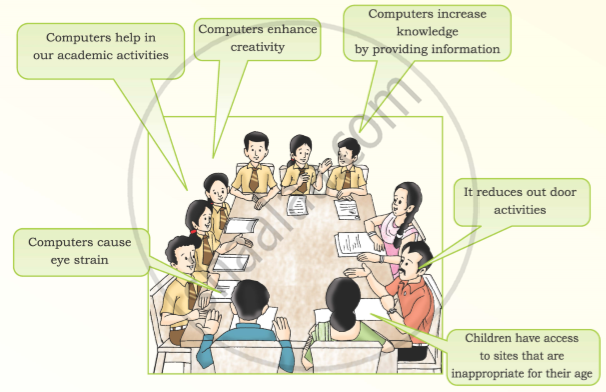Advertisements
Advertisements
Question
As you know, from the previous lesson you have just read, there are people in our country who have traditional knowledge about snakes, who even catch poisonous snakes with practically bare hands. Can you find out something more about them?
Solution
Some facts about snake charmers are as follows:
• Delhi government's amnesty scheme gave licence to many snake charmers rendering it legal to practice this trade.
• The snake charmers belong to the Nath sect and are followers of Lord Shiva or Bhole Nath.
• The skills of catching snakes are taught to them in their childhood.
• The snakes usually lie about in the open in the snake charmers' colonies.
• Small boxes, filled with sand, are also set up for the snakes there.
APPEARS IN
RELATED QUESTIONS
Thinking about the Poem
What does the poet like to do when it rains?
Thinking about the Poem
How does the woodpecker get her food?
What havoc has the super cyclone wreaked in the life of the people of Orissa?
This is a meeting of the school's Parent-Teacher Association. Some student representatives have also been invited to participate to discuss the role that Information Technology I Computers play in the growth and development of children.

The black man's face bespoke revenge
As the fire passed from his sight.
For all he saw in his stick of wood
Was a chance to spite the white.
The last man of this forlorn group
Did nought except for gain.
Giving only to those who gave
Was how he played the game.
Their logs held tight in death's still hands
Was proof of human sin.
They didn't die from the cold without
They died from the cold within.
Read the lines given above and answer the question that follow.
What does this say about what prejudice can do to people and the importance of working together?
Bangle sellers are we who bear
Our shining loads to the temple fair...
Who will buy these delicate, bright
Rainbow-tinted circles of light?
Lustrous tokens of radiant lives,
For happy daughters and happy wives.
Read the lines given above and answer the question that follow.
How are the bangles described in the first stanza of the poem?
It was a summer evening,
Old Kaspar's work was done,
And he before his cottage door
Was sitting in the sun,
And by him sported on the green
His little grandchild Wilhelmine.
She saw her brother Peterkin
Roll something large and round,
Which he beside the rivulet
In playing there had found;
He came to ask what he had found,
That was so large, and smooth, and round.
Read the lines given above and answer the question that follow.
What was Peterkin doing?
An old man with steel rimmed spectacles and very dusty clothes sat by the side of the road. There was a pontoon bridge across the river and carts, trucks, and men, women and children were crossing it. The mule-drawn carts staggered up the steep bank from the bridge with soldiers helping push against the spokes of the wheels. The trucks ground up and away heading out of it all and the peasants plodded along in the ankle deep dust. But the old man sat there without moving. He was too tired to go any farther.
Read the extract given below and answer the question that follow.
What does the reference to the old man in the beginning and the end of the passage indicate?
Read the extract given below and answer the questions that follow:
Where the mind is without fear and the head is held high
Where knowledge is free
Where the world has not been broken up into fragments
By narrow domestic walls (Where the Mind is Without Fear: Rabindranath Tagore)
(i) To whom is the poet praying? Whose mind is the poet referring to at the beginning of the poem? Why?
(ii) In which situation is the lead held high? What does he mean by 'knowledge is free'? What are 'narrow domestic walls'?
(iii) What does the poet mean by 'tireless striving'? What does 'clear stream' refer to? Explain.
(iv) What is meant by 'dead habit'? What is 'dead habits' compared to and why?
(v) What does ti» poet wish for al the end ~f the poem? What does tl1e poem tell the readers about the poet? Give a reason to justify yow· answer.
What did Number One and Number Two suggest should be done about the alien spacecraft?
Notice how in a comic book, there are no speech marks when characters talk. Instead what they say is put in a speech ‘bubble’. However, if we wish to repeat or ‘report’ what they say, we must put it into reported speech
Change the following sentences in the story to reported speech.
(i) Why is your face half-shaven?Gopal’s wife asked him______________________.
What surprised Mr. Purcell one day?
Why are dreams important? Mention two reasons.
What assurance did the sunrays give to Saeeda?
Multiple Choice Question:
Inner beauty of a person is shown in______
Replace the italicised portion of the sentence below with a suitable phrase from the box. Make necessary changes, wherever required.
I was in a difficult situation till my friends came to my rescue.
“You should be able to qualify with your eyes closed.” Who said these words and to whom?
Which of the following characters can be described as quick-witted, daring and loyal?
In Act V, Scene I of the play, The Tempest, Ariel reminds Prospero that it was the sixth hour because ______.
Why does Shane Koyczan begin the poem, Beethoven, with the word “Listen”?
